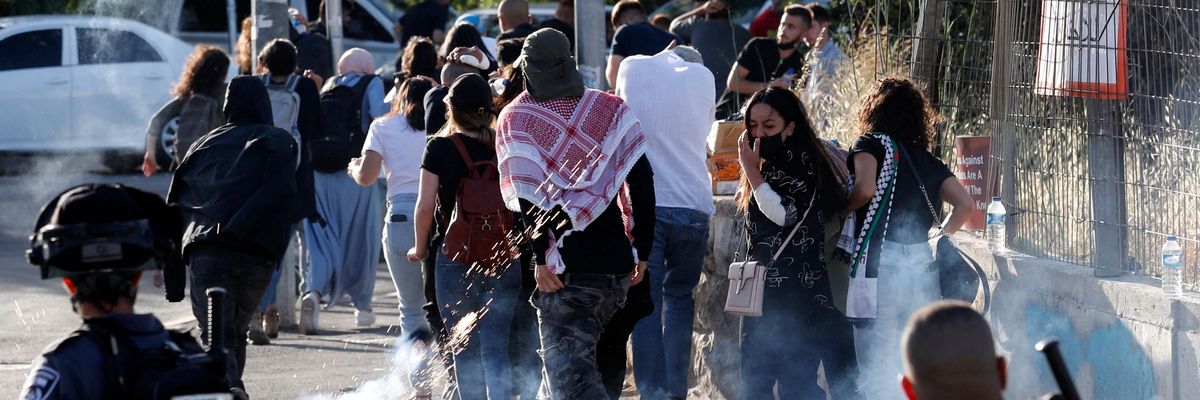Ala' Salaymeh (24) also lives in Sheikh Jarrah. She told openDemocracy that she expects the worst from the incoming government. She spoke of an anticipated rise in repressive policies, including the arbitrary arrest of activists, and more extreme measures as punishment, such as the revocation of Jerusalemite IDs or denial of access to medical insurance and services.
"Bennett's anticipated government is likely to be more right-wing and harsher in its approach towards Palestinian Jerusalemites fighting for their right to stay in their homes," she added.
Since early May, Israeli police have arrested more than 1,900 people across Israel, the vast majority of them Palestinian, plus a further 348 since the announcement on 20 May of a ceasefire in Gaza. A lawyer with the Public Committee Against Torture in Israel, an Israeli NGO, said that the campaign of mass arrests was clearly "a policy of suppressing demonstrations" rather than maintaining order or fighting crime.
Jonathan Pollack is a 39-year-old Israeli 'solidarity' activist who is continuously present in Jerusalem's threatened neighborhoods. He is particularly worried about the pressure that Netanyahu's right-wing allies will exert on the new government. He spoke of the ongoing incitement targeting Naftali Bennett's Yamina party: "This might push Bennett to prove himself even more, and absorb the fringes of Israel's right, to ensure the survival of his political career in case the current coalition collapses once Netanyahu is out of the picture."
More right-wing than Netanyahu
In a televised statement made on Sunday, Bennett requested his new government be sworn in on Wednesday 9 June. He appealed to Netanyahu directly, saying: "We are allowed to choose a government that you are not the leader of. One that is ten degrees more right-wing than yours." Netanyahu responded by calling Bennett a "liar", and continued to incite anger against his party, in the hope that several Yamina MKs would defect, sabotaging Bennett's attempt to unseat him.
The more right-wing government expected to be sworn in this week will be guided by ultra-nationalist politics, with the centre, left-wing and Islamist parties in the coalition serving as political fig leaf.
The new governing coalition is held together primarily by its aim to oust Netanyahu from power. By granting Bennett--the leader of a small party with just seven seats in the Knesset--the first rotation as prime minister, Yair Lapid considers his role as leader of the opposition fulfilled.
Israel's dysfunctional political system has spilled its damage on to the streets, allowing incitement of and violence against Palestinians to go unchecked.
The wave of escalating tension was perhaps most visible in the behavior of Israel's police in recent weeks. Officers raided Al-Aqsa Mosque, harassed Palestinians in Jerusalem, and waged a "militarized war against Palestinian citizens of Israel intended to intimidate and to exact revenge as punishment for their political positions and activities", as the director general of human rights organization Adalah said in a statement to Al Jazeera.
This escalation showed what a distracted political leadership can lead to. It eventually put Israel in a corner, as it faced a militaristic response from Palestinian resistance factions in Gaza and a wave of mass protests by Palestinians across historic Palestine.
Dysfunctional alliance
The new government will not be able to make any major policy changes, say observers. If anything, it will be more dysfunctional and more right-wing, risking further incitement and violence towards the Palestinian communities across historic Palestine.
Naftali Bennett and his political partner in Yamina, Ayalet Shaked, are both famous for their pronounced anti-Palestinian position. Together, they will occupy major positions within the new government.
Bennett did nothing when Shaked nearly wrecked the coalition talks by claiming the top seat on the judicial appointments committee, pushing aside the Labor party leader Merav Michaeli. This is a sign of what is to come; Bennett needs his right-wing ally and will meet her demands at the expense of his weak left-wing partners.
Bennett and Shaked will be backed by pro-annexation and pro-occupation parties, namely Yisrael Beiteinu, led by Avigdor Lieberman (with seven seats in the Knesset), New Hope led by Gideon Sa'ar (six seats) and Kahol Lavan, led by Benny Gantz (eight seats). The above-mentioned ensemble is known for its support for policies of dehumanization and violence towards Palestinians.
Some might say that the coalition's hands are tied due to its fragile alliance with the centrist Labor (seven seats) and left-wing Meretz (six seats) parties. But in reality the right-wing coalition partners will be reaching out to attract support from Netanyahu's allies in the Knesset.
By signing on to the coalition, Mansour Abbas, head of the United Arab List (Ra'am) party (four seats), is saving his political career. It was predicted that, if a fifth general election was held, Abbas's position as party leader would be up in the air, and his party would not make the electoral threshold necessary to enter the Knesset unless it rejoins The Joint List, a political alliance of four Palestinian-majority parties.
The United Arab List had put forward demands to satisfy its electorate, focusing on Arab communities in the south of Israel, rather than having a general agenda to serve the Palestinian community at large.
Palestinians across the occupied territories and Jerusalem, and those who hold Israeli citizenship, are not hopeful about what is to come. If there is a silver lining to this new government, it is its fragility. But if this fragility is caused by the constant incitement by Netanyahu and his allies, it will only push the coalition parties further and further right as they try to attract Netanyahu's supporters.
Bennett expects a new government that is "ten degrees more right-wing" than Netanyahu's, but for Palestinians the shift to the right might be even more extreme than that.
